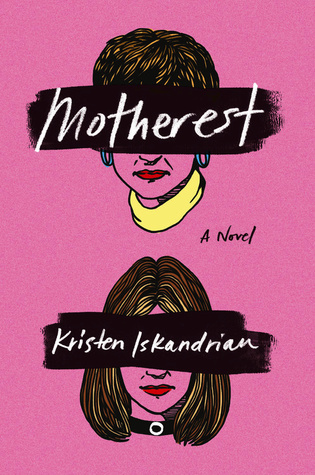Published by Twelve
Publication date: August 1st 2017


Today is part two of novels that did not work for me, but could be perfect for you. Motherest, by Kristen Iskandrian, ticks off a lot of the boxes in what I look for in my reading. Namely, a disaffected teenager brimming with angst, a dysfunctional family, and the ever-popular minefield of school—in this case, college. Agnes is headed off to her freshman year when the novel opens. She’s also writing to her mother which she will do in every chapter. Her mother never gets these letters, not because she is dead (which is too easy), but because she has left her family. This is the only way Agnes has of communicating with her, of sharing her life with her. As the months pass these letters to an unseen mother supplement a portrait of a young woman struggling to define herself.
For anyone with an overly active imagination and limited self-esteem, Agnes is immediately recognizable as a kindred spirit. When a boy she really likes talks to her, her inner dialogue goes into high gear
He is using me for my notes. That’s all. Or maybe that’s just the beginning. Maybe he’ll use me for everything I have. First he will use my notes. Then he’ll want money. Then my roommate. Maybe he’ll take my social security number; maybe he is a thief, maybe a murderer.
Scenes and passages like this welcome the reader ever further into Agnes’s mind. Additionally, Motherest has a strong supporting cast to bring back welcome and unwelcome remembrances of college years past even to readers who graduated decades ago. Iskandrian’s conjuring goes beyond college life to the most tender points of family relationships. Early on she’s already created enough mood that the scene of a father saying goodbye to a daughter at college makes my throat ache. Why? Because this is a man who’s lost a son to suicide and whose wife is gone and now his daughter’s response to if she’ll be home for Thanksgiving is to say, “I’ll let you know.” Four small words that evoke an instant visual of a man alone in an empty house, unwilling to insist his daughter comes home because he knows it’s not really a home anymore.
It isn’t too long before the above-mentioned boy (who never gets a real name) leaves Agnes in a different state: pregnant. At nineteen. She doesn’t tell him or anyone and moves through the middle of Motherest with only her long-gone mother knowing her thoughts and fears. She decides to keep the baby, hiding her weight gain under loose clothes.
It’s in the later stages of the pregnancy that my feelings about Motherest begin to shift. Agnes’s willful denial of her condition feels like an unnecessary and unwelcome manipulation. Her attitude of disinterest contradicts her decision to keep the baby. It’s beyond neglect and more a feeling of victimhood—this is happening to me, there is nothing for me to do. It doesn’t jibe with the decision to have a baby. As the novel proceeds this becomes more and more problematic, to the point of my shutting off the character. From that point on, when the novel takes even more outlandish turns I’m not invested. Instead, I feel as if I’ve been cheated. The novel I wanted and was loving has been swapped for something less interesting and filled with unnecessary embellishments to keep my attention. All of which left me angry. And when you take the emotions evoked by a novel personally then you know it’s a clear-cut case of It’s Not You, It’s Me.









It’s too bad Motherest took such a dramatic left turn. Sounds like another case of a strong start/good idea that just never got fully developed. I’m sure it’s not you!
I don’t know, it has a definite pull and if you get hooked it might not be the problem it was for me. I may have a sensitivity to plausibility.